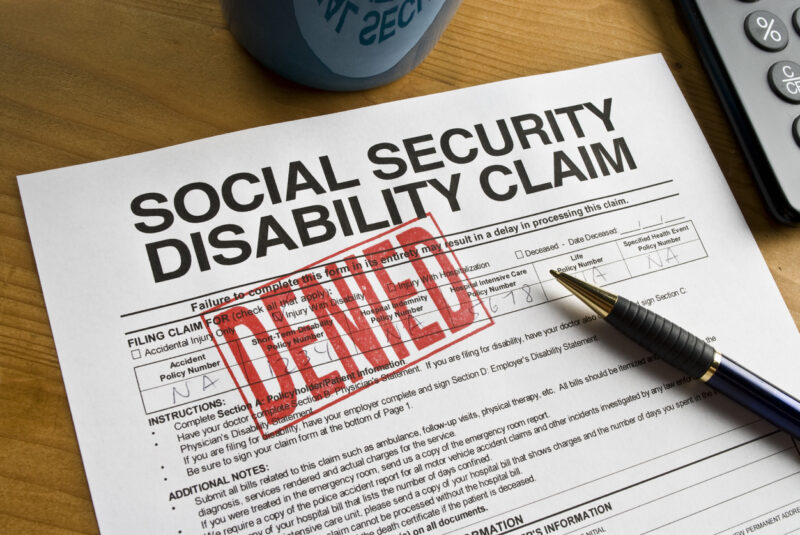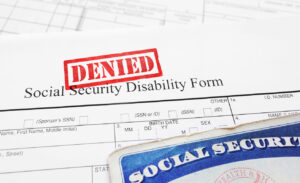The most common SSD Mistakes

The SSA (Social Security Administration) defines an individual with a disability as not being able to engage in any substantial gainful activity (SGA) because of a medically determinable physical or mental impairment(s) that is either expected to result in death or has lasted or is expected to last for a continuous period of at least 12 months. It’s no secret living with a disability is a challenging task. But if you are one of the over 42 million Americans living with a disability (PewResearch.org), making one of the slightest disability mistakes can make life even harder.
About the Social Security Disability Process
The start of a Social Security appeal can be quite intimidating, and there is no shortage of disability mistakes made. Some are far more common than others. The following guide is a tool to help you avoid those common mistakes – creating a more straightforward, less-daunting Social Security process that makes your appeal more likely to be approved.
Social Security Disability Insurance (SSDI) benefits have a five-month waiting period, meaning benefit payments will not begin before your sixth full month of disability. If you qualify for SSDI, the monthly amount you will receive depends on your Social Security earnings record. The more you worked and paid into Social Security taxes in the past, the more benefits you will receive.
SSDI vs SSI
Social Security features two disability benefits programs with similar names. Some qualify for both programs simultaneously, but a common disability mistake is confusing the two.
- Social Security Disability Insurance (SSDI) provides monthly payments to people with disabilities who qualify because they used to work.
- Supplemental Security Income (SSI) provides monthly payments to people with disabilities with low income and resources. Previous work is not a requirement to receive SSI.
The basic rules of Social Security Disability Insurance are:
- You must be insured and have worked long enough to be covered by SSDI.
- You must have a disability that meets Social Security standards. These standards use five determining factors to see whether you have a disability.
Common Disability Mistakes

While Social Security can be intimidating, it can also be highly confusing. When confusion sets in, it’s easy to make disability mistakes that could lead to benefits being delayed or even denied. The following are common disability mistakes you should be aware of and avoid when applying for disability benefits.
1) Assuming You Don’t Need or Can’t Afford a Disability Lawyer

Before filing a Social Security disability claim, it is recommended to consult with a disability attorney. Lawyers specializing in this category often give you a free case evaluation. These evaluations will give you a good sense of the validity of your claim.
At Parmele Law Firm, our experienced disability attorneys are well-versed in the Social Security disability system. We have the knowledge and expertise to guide you when filing a claim for approval and when you should wait to file it for the best chances of approval.
2) Filing a New Disability Claim as Opposed to Appealing a Denial

No one wants the news that their claim for Social Security Disability benefits has been denied. It’s infuriating when it happens, but it does to about 70% of applicants. Those who are denied often make one or multiple mistakes on their application. They follow that with another one of the common disability mistakes (especially those who don’t have legal representation) of filing a new claim instead of appealing the denial.
There are several reasons why you should refrain from filing a new claim. The most obvious one is your protected filing date is based on the date you first informed the Social Security Administration you intended to file for disability benefits. This protective filing date is then used to calculate the back pay owed to you. Should your claim be approved, you will be paid the money that would have been paid if you had started receiving benefits on the day of your protective filing date. When you start a new claim instead of filing an appeal, that entire process starts all over. This means you could miss out on thousands of dollars worth of benefits by adjusting your protective filing date.
As an applicant, you gain nothing by filing a new claim. However, you may lose quite a bit by doing so. The only scenario where it would be appropriate to file a new claim would be if you have exceeded your time limit for filing an appeal and can’t get an extension granted. In this case, it is essential to consult a Social Security Disability lawyer and determine your best course of action.
Parmele Law Firm specializes in assisting clients with the appeal process to ensure the applicant’s claim process doesn’t start over.
3) Missing Deadlines

Missing the deadline for appealing a denied SSDI claim can be a critical misstep in the disability application process. With approximately two thirds of initial applications being denied, the 60-day window to appeal holds vital importance. Claimants face the daunting task of restarting the entire application procedure without a timely response. Rapid action is crucial, with the Social Security Administration expecting responses in sometimes as little as 10 days. However, if more time is required, it is imperative to communicate with the SSA to request an extension. It’s easy to assume that you can do nothing if a claim is denied, but understanding the multiple stages of appeal, including reconsideration and administrative hearings, is crucial to keep the process alive. Given the stringent deadlines for form submissions, it is essential to diligently monitor incoming mail and respond promptly to ensure you get all notifications.
When navigating the intricacies of the disability claim process, missing crucial deadlines can lead to severe setbacks. The initial 60-day appeal period following a denial provides a critical opportunity to challenge the decision and advance through the subsequent stages of review. If additional information is requested through mailed forms, the urgency to meet tight turnaround times becomes paramount, sometimes as short as 10 days. Consequently, maintaining regular mail checks after submitting the application is essential to ensure that no critical notices are overlooked. Should any challenges arise in adhering to the strict deadlines, promptly contacting the local Social Security office for extensions or accommodations can help mitigate potential setbacks and keep the appeal process on track. Understanding and adhering to these critical time frames can significantly impact the outcome of an SSDI claim.
4) Not Including your Mental Disabilities in Your Application

It’s critical to the success of your application to list every diagnosed condition, physical or mental, that could affect you in the workplace in any way. Many applications are approved for Social Security disability benefits because of medically verifiable mental conditions. We implore you to refrain from judging whether a condition will affect the status of your application and lead to you receiving benefits. Make it easy and report all medical conditions you have been diagnosed with.
Applicants with mental disabilities often find it helpful to retain a Social Security disability lawyer when applying for disability benefits. This attorney can help ensure your doctors and mental health professionals describe any mental conditions you may have in a way that will best support your claim.
5) Discontinuing Treatment with Your Physician

Many with disabilities find themselves in a difficult situation when it comes to continuing to see their healthcare provider. If you are unable to continue working, you most likely do not have the funds to pay for a doctor’s visit, let alone other necessities of life. However, if you are unable to receive medical treatment, your chances of recovery diminish significantly. Additionally, if you have a terminal condition, the quality and length of your remaining life could be severely affected.
Most do not understand that discontinuing treatment with your doctor compromises the likelihood of an approved Social Security Disability claim. Most of the disabling conditions Social Security Disability examiners use to determine your eligibility for benefits require that your condition not improve despite following your doctor’s recommended treatments.
How Parmele Can Help

You don’t have to face the Social Security Administration on your own. Every day, we vigorously fight on behalf of our clients. Over the years, we’ve helped tens of thousands of clients receive the Social Security Disability benefits they deserve, and we want to do the same for you. Our commitment to our clients is taken seriously. We’re by your side every step of the way to guide you and provide hope.
Contact us today to see how Parmele Law Firm can help with your Social Security Disability claim.
FAQ
The SSA (Social Security Administration) defines an individual with a disability as not being able to engage in any substantial gainful activity (SGA) because of a medically determinable physical or mental impairment(s)
SSDI (Social Security Disability Insurance) is for those who have worked and paid Social Security taxes, while SSI (Supplemental Security Income) is for people with disabilities who have low income and resources, regardless of their work history.
SSDI benefits have a waiting period of five months, meaning that benefit payments will not begin before the sixth full month of disability.
It’s advisable to ensure you have a qualifying condition and adequate work history before applying for disability benefits to avoid potential delays or denials. However, notify the SSA of your intent to file immediately after suffering from or becoming aware of a potential disability.
A disability attorney can provide a free case evaluation, helping you understand the validity of your claim and guiding you through the complex Social Security disability system for the best chances of approval.
Filing a new claim instead of appealing a denial can reset your protective filing date, potentially resulting in a loss of thousands of dollars in benefits. It’s crucial to appeal rather than reapplying, except in specific time-constrained scenarios.
Listing all diagnosed conditions, including mental disabilities, can significantly impact the approval of your application for Social Security disability benefits, especially as certain mental conditions can qualify applicants.
While financial constraints can make it difficult to continue treatment, discontinuing treatment can diminish the likelihood of an approved Social Security Disability claim, as the condition’s lack of improvement can affect eligibility.
The monthly amount of SSDI benefits you receive depends on your Social Security earnings record, meaning the more you worked and paid into Social Security taxes in the past, the more benefits you will receive.
Consult a Social Security Disability lawyer to understand your options for appealing the denial and ensure you follow the proper procedure without compromising your protective filing date.
